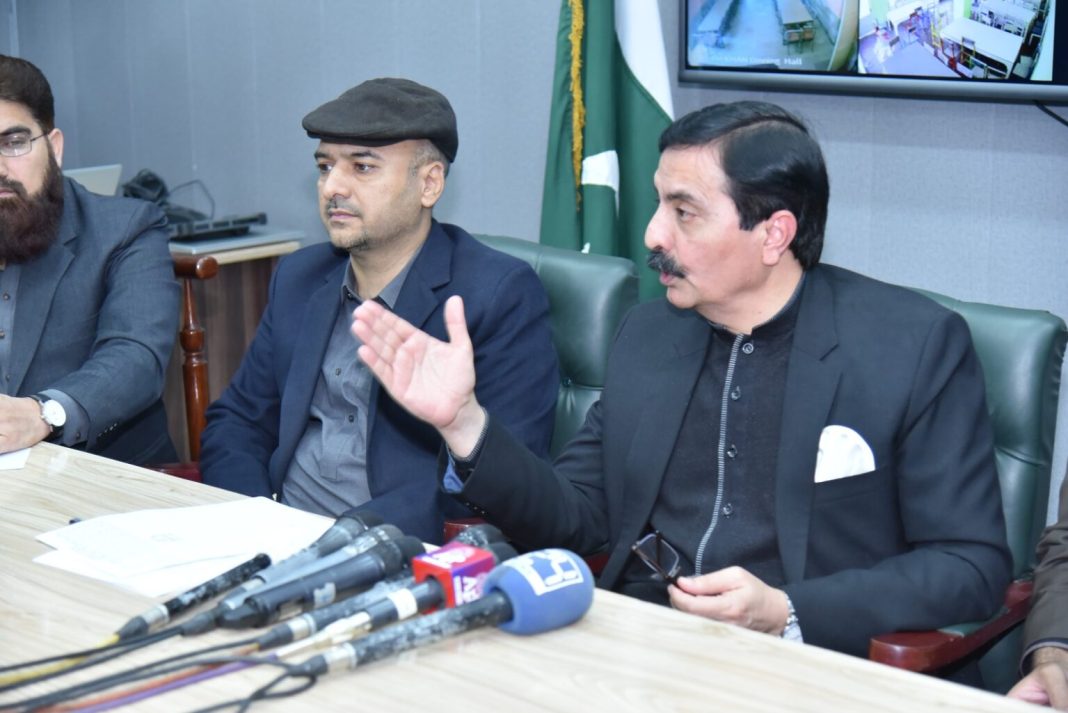Staff Report
ISLAMABAD: Pakistan Bait-ul-Mal (PBM) has removed human intervention and traditional bureaucratic hurdles or traditional red tape from all its service domains, Managing Director Amir Fida Paracha said Friday.
Briefing media on the launching of World Bank’s PMDT (Project Management and Tracking Design) in PBM and one-year performance, he said eliminating bureaucratic hurdles in Pakistan Bait-ul-Mal has expedited the processing of requests for various services, including medical aid, education support, cochlear implants, individual financial assistance, and more, through paperless e-filing. Utilizing digital systems enhances administrative efficiency, and a new Directorate for donation management has been established under the Bait-ul-Mal Act.
Digitizing Women Empowerment Centers, Child Labor Rehabilitation Centers, and Pakistan Sweet Homes, the organization ensures secure payment transactions via a biometric system. The incorporation of gender, whistle-blowing, and conflict of interest policies aligns with the Ministry of Poverty Alleviation and Social Safety guidelines. PBM has adopted the PMDT score system, in line with recommendations from the World Bank and other international organizations, using paperless and digital processes to foster transparency in the institution and streamline service accessibility. Now, applications can be swiftly processed using electronic filing, eliminating the need for traditional paperwork, Amir Fida Paracha said.
Since its establishment in 1992, PBM has transitioned from manual operations to embracing (electronic management information system) EMIS, e-governance, and digital procedures. He said PBM has revamped its services by adopting modern technology and implementing a digital system, leading to substantial improvements in benefits management.
PBM has introduced automation within the department, enhancing human resource management and modernizing fund and pension systems. This has successfully eliminated traditional obstacles, providing employees with access to the Management Information System (MIS) for their GP fund and advances.
A Donation Management Directorate has been established within the institution to foster collaboration with donor agencies and philanthropists.
Given the ongoing economic challenges, this approach aims to ease the burden on the Government of Pakistan, ensuring that Baitul Mal is not solely reliant on the annual budget.
A newly established Directorate, P&I, (Procurement and Inventory) within PBM is now equipped to handle bidding or tender processes in all offices nationwide at the central level swiftly, utilizing the Papra E-Pad system. According to Paracha, this initiative will enhance transparency in the process.
Digital cameras are now overseeing the facilities at Pakistan Sweet Homes, contributing to enhanced discipline and improved amenities, said Paracha.
Paracha mentioned that in Pakistan Sweet Homes, an organization dedicated to supporting orphans, the provision of accommodation, food, and education has been expanded to intermediate levels instead of just matriculation. Furthermore, the institution will continue to cover expenses for university education.
Schools for child laborers under PBM initially offered education up to the primary level, but through a phased pilot program, several institutions have now been upgraded to the middle level.
A remarkable exhibition and ceremony were organized at F-9 Park to showcase the achievements and contributions of all projects and PBM to donors. This event, a first in the department’s history, is producing meaningful outcomes, according to the Managing Director.
PBM is launching a women empowerment project in collaboration with institutions such as Islamic Relief. Thanks to our endeavours, numerous local and international organizations are expressing confidence in PBM, and we are progressing towards establishing partnerships with them.
An international organization collaborating with PBM has pledged, for the first time, to supply cochlear implants to hearing-impaired children and offer grants for their treatment, stated Managing Director PBM Amir Fida Paracha.
Amid financial challenges, PBM has persevered, maintaining the continuity of previous governments’ welfare initiatives, particularly shelter homes and food trucks catering to the underprivileged. Additionally, there have been no layoffs of daily-wage workers.
UNICEF’s backing has facilitated the initiation of the OWSP initiative, which sponsors orphans and widows. Through OWSP, (Orphan Widows Support Program). monthly aid of up to 16,000 is extended to orphans within a family after completing matriculation at Sweet Homes.
Concluding the press conference, the Managing Director of PBM expressed confidence that the ongoing reforms and initiatives would boost the organization’s efficiency, credibility, and goodwill, instilling trust in government agencies. He extended gratitude to all journalists for attending the press conference.




